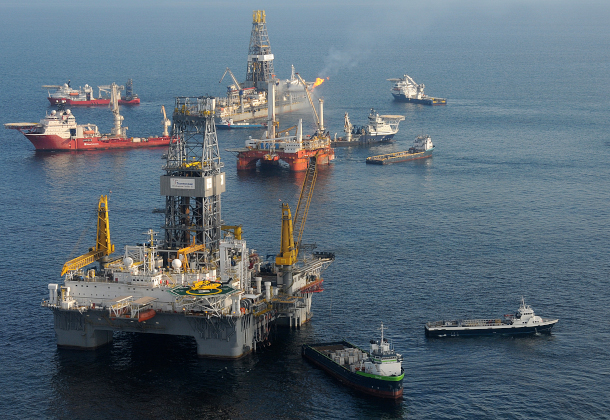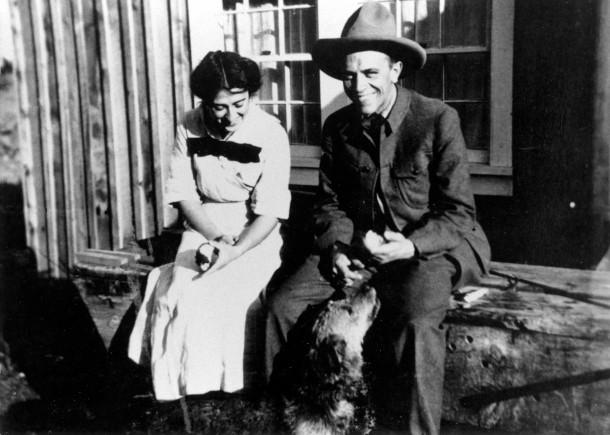Beyond the Headlines
Air Date: Week of January 15, 2021

The mobile offshore drilling unit (near) prepares to drill a relief well at the Deepwater Horizon site, as another unit holds position directly over the damaged blowout preventer. Drillship Discover Enterprise (far) captures oil from the ruptured riser. (Photo: Petty Officer 3rd Class Patrick Kelley, U.S. Coast Guard, Flickr, CC BY-ND 2.0)
This week Environmental Health News Weekend Editor Peter Dykstra and Host Steve Curwood remark on 2020’s tie with 2016 for the hottest year on record, and explore the climate-warming consequences of methane leaks from abandoned oil and gas wells in the ocean. They then turn to the history calendar to celebrate the birthday of Aldo Leopold, the renowned author of Sand County Almanac and the ecologist known as “the father of wildlife conservation”.
Transcript
BASCOMB: It’s Living on Earth, I’m Bobby Bascomb.
CURWOOD: And I’m Steve Curwood.
Let's take a look beyond the headlines now with Peter Dykstra. Peter's an editor with Environmental Health News. That's EHN.org and DailyClimate.org. He's joining us now on the line from Atlanta, Georgia, where you've been looking out beyond those headlines, Peter and seeing what?
DYKSTRA: Hi, Steve. Well, last year is not everybody's favorite year 2020. But in one category, we were number one, or at least tied for number one, because 2020 and 2016 are tied as the hottest year ever on record.
CURWOOD: Yeah, I'm not sure that that's a record that 2020 should be proud of, or actually anybody on the planet. So what are we talking about?
DYKSTRA: The global average temperature in 2020, was about two and a quarter degrees Fahrenheit warmer than the average, or the global average temperatures from the year 1850 to 1900. That data comes from the Copernicus Climate Change Service. They're one of the number keepers for how hot it is.
CURWOOD: Now, Peter, I think all of these hot years have been in fairly recent decades, right?
(Video: Global Warming from 1880 to 2019, NASA, Public Domain)
DYKSTRA: 1998 was the most distant year to make the top 10. Every year other than that has been in the 21st century, which is barely one fifth old.
CURWOOD: Yeah. And it keeps going up and up and up. Makes me think we're in a runaway reaction, Peter.
DYKSTRA: I think we are.
CURWOOD: Let's turn now, though, to other news, what do you have for us?
DYKSTRA: Well, we have something that may be one of the causes of that runaway climate reaction. There was a survey of the Gulf of Mexico, there are 10s of 1000s of abandoned oil and gas wells. The fact that there are regulations not enforced leaves climate warming gas emissions unchecked, specifically, methane.
CURWOOD: And how big a deal is the amount of methane being released do you think?
(Video: Methane Sources, NASA, Public Domain)
DYKSTRA: Well, according to NASA, methane is 28 times as potent a greenhouse gas as CO2. A lot of other agencies say methane is even worse than that. But NASA also says that during the entire 20th century, methane is responsible for 23% of all climate change.
CURWOOD: So just how many of these wells are around perhaps leaking methane, do you think?
DYKSTRA: 10s of 1000s in the Gulf of Mexico alone, of course, there's offshore drilling off of West Africa and Russia, in the Mexican part of the Gulf of Mexico, and so many other locations around the globe, that what happens in the Gulf is only part of what happens around the world. And a lot of that is due to not poor enforcement of laws, but the fact that there are nearly no enforcers out there looking for leaky wells.
CURWOOD: Let's take a look back at history Peter and tell me what you see.
DYKSTRA: We have a birthday! Aldo Leopold, one of the greatest, most influential environmental authors had a birthday on January 11, the year 1887. His most famous book is A Sand County Almanac.
CURWOOD: Well tell me what's in the book.
DYKSTRA: Well, Sand County is a mythical version of his home, which was Sauk County, Wisconsin, in the town of Baraboo, Wisconsin. The book was just a wonderfully written inventory, if you will, of wildlife and nature near his home. Another irony about the mythical Sand County is it's in the region of southwestern Wisconsin that was heavily mined for fracking sand in the last couple of decades, even that's begun to decline as the fracking industry falls into disfavor.
CURWOOD: Baraboo has another claim to fame, right?
DYKSTRA: Oh, yeah. It's home of the International clown Hall of Fame!

Author and ecologist Aldo Leopold (right), with his daughter, Estella (left). (Photo: Pacific Southwest Forest Service, Flickr, CC BY 2.0)
CURWOOD: I wasn't thinking of that. Peter. I was thinking of the International Crane Foundation.
DYKSTRA: Well, it is the home of the International Clown Hall of Fame although Aldo Leopold is not a member. The International Crane Foundation are environmental heroes, for among other things, they're considered the saviors of the Whooping Crane. Aldo Leopold, by the way, died in 1948, while helping a neighbor battle a fire. A Sand County Almanac, his most famous book, wasn't even published till a year after his death.
CURWOOD: Thank god they found the manuscript Peter. Peter Dykstra is an editor with Environmental Health News. That's EHN.org and DailyClimate.org. We'll talk to you again real soon, Peter.
DYKSTRA: All right, Steve, thanks a lot. Talk to you soon.
CURWOOD: Thank you. And there's more on these stories at the Living on Earth website. LOE.org.
Links
The NY Times | “2020 Ties 2016 as Hottest Yet, European Analysis Shows”
Living on Earth wants to hear from you!
Living on Earth
62 Calef Highway, Suite 212
Lee, NH 03861
Telephone: 617-287-4121
E-mail: comments@loe.org
Newsletter [Click here]
Donate to Living on Earth!
Living on Earth is an independent media program and relies entirely on contributions from listeners and institutions supporting public service. Please donate now to preserve an independent environmental voice.
NewsletterLiving on Earth offers a weekly delivery of the show's rundown to your mailbox. Sign up for our newsletter today!
 Sailors For The Sea: Be the change you want to sea.
Sailors For The Sea: Be the change you want to sea.
 The Grantham Foundation for the Protection of the Environment: Committed to protecting and improving the health of the global environment.
The Grantham Foundation for the Protection of the Environment: Committed to protecting and improving the health of the global environment.
 Contribute to Living on Earth and receive, as our gift to you, an archival print of one of Mark Seth Lender's extraordinary wildlife photographs. Follow the link to see Mark's current collection of photographs.
Contribute to Living on Earth and receive, as our gift to you, an archival print of one of Mark Seth Lender's extraordinary wildlife photographs. Follow the link to see Mark's current collection of photographs.
 Buy a signed copy of Mark Seth Lender's book Smeagull the Seagull & support Living on Earth
Buy a signed copy of Mark Seth Lender's book Smeagull the Seagull & support Living on Earth

